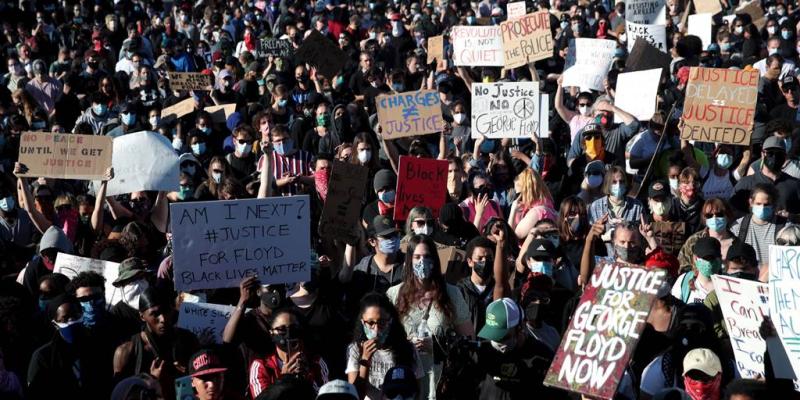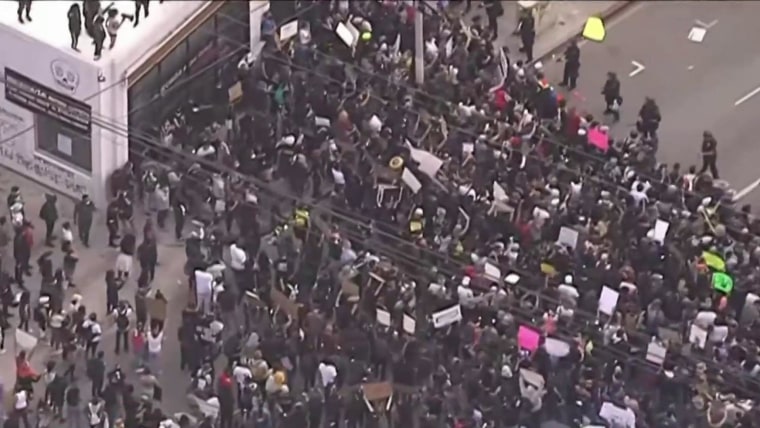Protests could cause catastrophic setback for controlling coronavirus, experts say



Within the last few days, careful social distancing has been overturned by demonstrations against social injustice — as thousands of Americans congregate in cities across the country protesting the death of George Floyd.
The large gatherings, infectious disease experts said, could cause a catastrophic setback for controlling COVID-19 in the U.S. as cities and states try to reopen.
"It makes me cringe on a number of levels," said Dr. Katie Passaretti, medical director for infection prevention at Atrium Health in Charlotte, North Carolina.
"It's a setup for further spread of COVID," Passaretti added. "It's heartbreaking."

Protests leave little space for social distancing as coronavirus rages on
May 31, 202002:22
The national unrest comes amid a global pandemic, which has already sickened more than 1.7 million people in the U.S., killing nearly 105,000.
Let our news meet your inbox. The news and stories that matters, delivered weekday mornings. Sign Up
COVID-19 spreads mainly through close contact, particularly large respiratory droplets from sneezes, coughs — as well as shouting and yelling.
"If you were out protesting last night, you probably need to go get a COVID test this week," said Atlanta Mayor Keisha Lance Bottoms at a news briefing Sunday, "because there's still a pandemic in America that's killing black and brown people at higher numbers."
Indeed, the Centers for Disease Control and Prevention has said African Americans are disproportionately affected by COVID-19.
"It's hard to step back and believe all this is going on at the same time."
"It's concerning on a number of fronts, amid multiple horrible situations," Passaretti said. "It's hard to step back and believe all this is going on at the same time."
On Sunday, Dr. Scott Gottlieb, former chief of the Food and Drug Administration warned that the U.S. "isn't through this epidemic" yet. "Chains of transmission will have become lit from these gatherings," Gottlieb told CBS News' "Face the Nation."
The New York City Department of Health and Mental Hygiene tweeted guidance Saturday for protesting during the epidemic, advising participants to wear a face covering, use hand sanitizer and wear eye protection to prevent injury.
Plan to protest? Here are tips to reduce the risk of spreading #COVID19:
✔️Wear a face covering
✔️Wear eye protection to prevent injury
✔️Stay hydrated
✔️Use hand sanitizer
✔️Don't yell; use signs & noise makers instead
✔️Stick to a small group
✔️Keep 6 feet from other groups — nychealthy (@nycHealthy) May 30, 2020
While many protestors at the more than 100 demonstrations nationwide appear to be wearing face coverings, social distancing — keeping at least 6 feet away from other people — is not happening. Face masks are not intended to stop the spread of the coronavirus, but experts say they can help reduce the risk of spreading the illness to others.
"Masks aren't perfect, but a layer of protection is better than not having anything," Passaretti said.
Passaretti also expressed concern that protesters may be traveling to and from a various cities and states, potentially spreading the virus.
"People are coming from other locations to major cities," Passaretti said. "So not only is there potential for spread at a given protest, people may take that back home," and spread the virus to other areas.
Follow NBC HEALTH on Twitter & Facebook.
 Erika Edwards
Erika Edwards
Erika Edwards is a health and medical news writer and reporter for NBC News and "TODAY."
Jane Weaver contributed.





What I have been watching from afar is a nation imploding. God help you all.
... but you often offer the dismissive - "You don't live here so your opinion is worthless."
I'm quite happy I don't live in the USA. The fact that I don't live there doesn't mean I can't feel sorry for you.
We have imploded many times yet here we are.
only in your dreams and maybe some communist propaganda.
well over 99.9 percent of the country is completely unaffected by these riots.
Well, you do have kind of a "perfect storm" going on these days - the virus, the economy, the riots.
oh please, the drama.... LOL
just another day in the usa.
don't fall for the hype
how many riots and cities burned under obama? didn't even faze us.... LOL
What do they care? Most are young and in low risk groups.
Mostly punk assed kids with no concern for anything but themselves.
Truly a sad state of affairs i'm thinking as i'm watching the the mini series Grant on history channel. What an impressive generation that was.
This generation? Not so much, not even close.
Which Grant?
US Grant. Great documentary on History channel.
Find it, its worth watching if you love history like i do.
I thought so but I thought it might have been about Cary Grant also.
What that generation did to abolish slavery in this country is truly amazing and not appreciated enough today. Over 400,00 dead on the union side alone not counting civilian casualties. 400,000 ..... mainly white men.
Yeah, we still have issues like rogue cops, etc but make no mistake about it, we have come a long, long way in 150+ years. I wonder how many of these looters even know who US Grant is.
Not many i bet.
Your argument about what the Civil War generation did for black people would be far far far more persuasive if the Civil War had not been followed by 100 years of racial discrimination and oppression which did not legally end until the Civil Rights Act of 1964. 100 years. Those 100 years largely wiped out the good will associated with the end of slavery.
And of course, racism is still widespread in America today. Not even the Civil Rights Act could end it.
www.history.com /news/gi-bill-black-wwii-veterans-benefits
How the GI Bill's Promise Was Denied to a Million Black WWII Veterans
When Eugene Burnett saw the neat tract houses of Levittown, New York, he knew he wanted to buy one. It was 1949, and he was ready to settle down in a larger home with his family. The newly established Long Island suburb seemed like the perfect place to begin their postwar life—one that, he hoped, would be improved with the help of the GI Bill , a piece of sweeping legislation aimed at helping World War II veterans like Burnett prosper after the war.
But when he spoke with a salesman about buying the house using a GI Bill-guaranteed mortgage, the door to suburban life in Levittown slammed firmly in his face. The suburb wasn’t open to black residents.
“It was as though it wasn’t real,” Burnett’s wife, Bernice, recalled . “Look at this house! Can you imagine having this? And then for them to tell me because of the color of my skin that I can’t be part of it?”
The Burnetts weren’t the only black Americans for whom the promise of the GI Bill turned out to be an illusion. Though the bill helped white Americans prosper and accumulate wealth in the postwar years, it didn’t deliver on that promise for veterans of color. In fact, the wide disparity in the bill’s implementation ended up helping drive growing gaps in wealth, education and civil rights between white and black Americans.
While the GI Bill’s language did not specifically exclude African-American veterans from its benefits, it was structured in a way that ultimately shut doors for the 1.2 million black veterans who had bravely served their country during World War II, in segregated ranks.
Fear of Black Advancement
When lawmakers began drafting the GI Bill in 1944, some Southern Democrats feared that returning black veterans would use public sympathy for veterans to advocate against Jim Crow laws . To make sure the GI Bill largely benefited white people, the southern Democrats drew on tactics they had previously used to ensure that the New Deal helped as few black people as possible.
During the drafting of the law, the chair of the House Veterans Committee, Mississippi Congressman John Rankin, played hardball and insisted that the program be administered by individual states instead of the federal government. He got his way. Rankin was known for his virulent racism: He defended segregation, opposed interracial marriage, and had even proposed legislation to confine, then deport, every person with Japanese heritage during World War II.
When the bill came to a committee vote, he stonewalled in an attempt to gut another provision that entitled all veterans to $20 a week of unemployment compensation for a year. Rankin knew this would represent a significant gain for black Southerners, so he refused to cast a critical proxy vote in protest. The American Legion ended up tracking down the Congressman who had left his proxy vote with Rankin and flying him to Washington to break the deadlock.
Roosevelt signed the Servicemen’s Readjustment Act into law on June 22, 1944, only weeks after the D-Day offensive began. It ushered into law sweeping benefits for veterans, including college tuition, low-cost home loans, and unemployment insurance.
The GI Bill’s Effect on Black Veterans
From the start, black veterans had trouble securing the GI Bill’s benefits. Some could not access benefits because they had not been given an honorable discharge—and a much larger number of black veterans were discharged dishonorably than their white counterparts.
Veterans who did qualify could not find facilities that delivered on the bill’s promise. Black veterans in a vocational training program at a segregated high school in Indianapolis were unable to participate in activities related to plumbing, electricity and printing because adequate equipment was only available to white students.
Simple intimidation kept others from enjoying GI Bill benefits. In 1947, for example, a crowd hurled rocks at black veterans as they moved into a Chicago housing development. Thousands of black veterans were attacked in the years following World War II and some were singled out and lynched.
Though Rankin had lost the battle to exclude black men from VA unemployment insurance, it was doled out inequitably. Men who applied for unemployment benefits were kicked out of the program if any other work was available to them, even work that provided less than subsistence wages. Southern postmasters were even accused of refusing to deliver the forms black veterans needed to fill out to receive their unemployment benefits.
Black veterans’ and civil rights groups protested their treatment, calling for protections like black involvement in the VA and non-discriminatory loans, but the racial disparities in the implementation of the GI Bill had already been set into motion. As the years went on, white veterans flowed into newly created suburbs, where they began amassing wealth in skilled positions. But black veterans lacked those options. The majority of skilled jobs were given to white workers.
A White Post-War Housing Boom—And Redlining in Black Neighborhoods
The postwar housing boom almost entirely excluded black Americans, most of whom remained in cities that received less and less investment from businesses and banks.
Though the GI Bill guaranteed low-interest mortgages and other loans, they were not administered by the VA itself. Thus, the VA could cosign, but not actually guarantee the loans. This gave white-run financial institutions free reign to refuse mortgages and loans to black people.
Redlining —a decades-old practice of marking maps by race to characterize the risks of lending money and providing insurance—made purchasing a home even more difficult for black veterans. Lenders froze out poorer neighborhoods, ensuring that loan assistance and insurance would be denied. And new white suburbs often came with overtly racist covenants that denied entry to black people.
In 1947, only 2 of the more than 3,200 VA-guaranteed home loans in 13 Mississippi cities went to black borrowers. “These impediments were not confined to the South,” notes historian Ira Katznelson. “In New York and the northern New Jersey suburbs, fewer than 100 of the 67,000 mortgages insured by the GI bill supported home purchases by non-whites.”
Failure to Receive GI Bill Education Benefits
Black veterans in search of the education they had been guaranteed fared no better. Many black men returning home from the war didn’t even try to take advantage of the bill’s educational benefits—they could not afford to spend time in school instead of working. But those who did were at a considerable disadvantage compared to their white counterparts. Public education provided poor preparation for black students, and many lacked much educational attainment at all due to poverty and social pressures.
As veteran applications flooded universities, black students often found themselves left out. Northern universities dragged their feet when it came to admitting black students, and Southern colleges barred black students entirely. And the VA itself encouraged black veterans to apply for vocational training instead of university admission and arbitrarily denied educational benefits to some students.
It's not an argument John it's a simple observation of fact. What transpired AFTER the Civil War has absolutely NOTHING to do with what that generation sacrificed to abolish slavery.
I find your general lack of appreciation for those sacrifices to be just one more sad commentary to these present times.
Thanks for demonstrating the history of Democrats and their racist policies. They haven't changed much have they JR?
Who says I dont appreciate their sacrifices?
A lot of those young men who died to end slavery would be appalled to see that 150 years later the country is still filled with racism.
Again ........... absolutely nothing to do with my comment.
You want to discuss how badly Vets have been treated in the past i'll be happy to participate if you want to start another article about it. I've got lots more examples for you that DON"T include black Vets.
All i know is you couldn't be bothered to acknowledge them at all directly after my comment.
You just want to piss and moan like usual. SOSDD
People who actually know and understand history know that the parties have switched positions on racial issues in the past 75 years.
At the time of the Civil War and for a long time afterward, the south was Democratic and the north was Republican. Now that has largely been reversed and the south is solid Trump.
The opposition to civil rights legislation after WW2 and before and after that, came mainly from the south and the southerners in Congress.
Read some history for gods sake so you can know what you are talking about.
You arent up to debating with me, so I wont waste my time.
JR goes into intellectual attack mode ..... watch out. It's scary! /S
I've likely forgot more about Civil War history and what came after than you've ever known.
You are out of your depth once again ..... and badly
Really, I just love the imaginary parties switched theme, FFS you have elected a outright racist to run against Trump. You don't have to micro analyze his words to come to that conclusion either.
Espousing democrat racial policies sure put you in your place.
As I watch the rioting on the news I am thinking the same Sparty.
They wander around after curfew and then cry boo hoo when the police attempt to tell them to get their asses home. Most of them have no idea why they are even there.
I love it when they whine about getting hit with rubber bullets. They really think they are doing something. Meanwhile some of their fellow generation are taking real bullets. They are the cream of the crop of that generation not these narcissistic little pricks who are rioting and looting.
They should be ashamed of themselves. Problem is they have no shame so that will never happen.
You may be arrested and/or Closed down and fined, if you allow ANY patrons into your business to make a living......
….BUT....
…... Go ahead and gather tightly together by the thousands for a "Good Cause" ?
Now THAT makes sense !